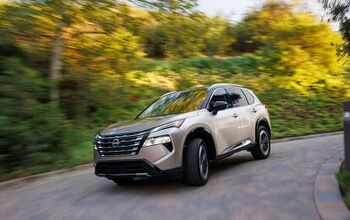Ford's Also Readying A Prius Fighter, But Don't They Already Have One?
Our Ford sources have confirmed a Reuters report that claims Ford is readying a new lineup of dedicated hybrids to take on the Toyota Prius.
The new range, set to debut in late 2018, will ride on the next-generation C-platform that underpins the current Ford Escape and Focus. Dubbed “C240”, volume has been pegged at 120,000 units annually, with production taking place at the Wayne, Michigan assembly plant.
In addition to a range of bodystyles, both regular hybrid and plug-in versions are set to be offered. Although much talk has been made of the distinct nature of these new vehicles, Ford already offers the C-Max as a hybrid-only vehicle – though the C-Max was originally set to be offered as a gasoline-powered minivan in varying lengths, with 5 or 7 seats.
The C-Max was originally offered with the 1.6L Ecoboost and 2.5L I4 engines, but in between its 2011 debut and its 2012 on sale date, Ford pivoted to a hybrid-only strategy. TTAC sources claim that Ford’s $5.9 billon loan from the government’s Advanced Technology Vehicles Manufacturing program was used to convert the C-Max (and its assembly facilities) into a hybrid-only offering that would ostensibly offer Ford numerous regulatory benefits (in the form of an increased CAFE rating and regulatory credits) as well as a unique marketing edge.
Although look is more akin to the larger Prius V, the C-Max is Ford’s de facto Prius competitor, by nature of its hybrid-only powertrain and odd (for North America) shape and footprint. But sales have been modest, with 35,000 units sold in 2013, and questions regarding its fuel economy figures, coupled with disgruntled owners, have hurt its image. Perhaps Ford is looking to launch a clean sheet Prius competitor backed by a clean-sheet design and marketing effort.
More by Derek Kreindler
Latest Car Reviews
Read moreLatest Product Reviews
Read moreRecent Comments
- Analoggrotto The ORDER BOOKS in Australia have netted 300% above projection. Australia is so awesome and they are embracing the Telluride DIesel to overtake the Prado. Pentagon data, and eATPs rule the discussion, bar none. Toyota fans can go home with their sorry little turbo 4 cylinder.
- Analoggrotto Such a loving artful tribute to TTAC's greatest godfather is much welcomed. There's a new and better PORSCHE and they are from SOUTH KOREA baby! After years of Japanese oppression, SOUTH KOREA is the TIGER of the Far EAST. We just need a modern day James Dean and that would be Rhys Millen!
- Groza George Our roads and bridges are crumbling and increasing vehicle weight will only make bridges crumble faster. We need more infrastructure work.
- Wolfwagen Pennsylvania - Two long straights, 1 medium straight, 1 super short straight and a bunch of curves all on one end
- Haze3 EV median weight is in the range of 4500-5500lbs, similar to the low end of full size pickup trucks and SUV's or typical mid-size PU's and SUV's. Obviously, EV Hummers and PU's are heavier but, on average, EV=PU or mid/full SUV is about right. EV's currently account for ~1% of the cars on the road. PU's account for 17% and SUV's count for over 40%. If we take out light SUV's, then call it 30% SUV or so. So, large-ish PU's and SUV's, together, account for ~50% of the US fleet vs 1% for EV's. As such, the fleet is ALREADY heavy. The problem is that EV's will be making the currently lighter 50% heavier, not that PU/SUV haven't already done most of the damage on avg mass.Sure, the issue is real but EV responsibility is not. If you want to get after heavies, that means getting after PU/SUV's (the current problem by 40-50x) first and foremost.


































Comments
Join the conversation
Love my C-Max Energi. Currently at 67 average MPG. Here in the republic of the Jetta TDI wagon, the C-Max is everywhere, and for good reason. If you don't do the majority of your driving on long highway trips it makes perfect sense. If Ford could fix the trunk space problem with a new model, that'd be awesome. Also maybe the doors don't need to weigh three tons each? I suspect Ford could put their cars on a diet and gain back a few miles per gallon.
Wasn't Toyota supplying their hybrid tech to Ford few years back? I also thought Toyota is working with Ford to implement hybrid tech into their trucks. Either way, everyone has been claiming to kill the Prius sooner or later but it hasn't happened. Toyota is too far ahead with its tech and consistent enhancements.